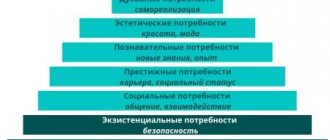Every person should have their own island of success in life. For some it is determined in the professional sphere, for others in personal qualities, family traditions, ability and desire to learn something new throughout their lives. Sometimes it is difficult to understand yourself and your desires. Modern techniques allow you to effectively find life guidelines.
The concept of personality types and the relationships between them is relatively new. Socionics offers a completely new approach to personality type and the application of this gradation in practice.
Personality types in socionics
Socionics is based on the tandem of the typology of psychotypes by the psychologist from Switzerland Jung and the theory of information metabolism from Poland by Kempinski. The individual is fed by information signals. Eight psychotypes are taken from Jung's idea: thinking, feeling, sensation, intuition. For each type, two directions - introverted, extroverted.
Based on Jung's classification, over time, methods emerged that made it possible to divide people into types, although this was not originally intended for humans. After this, an assumption appeared that in the process of perceiving the environment, the human psyche functions with logic, ethics, sensory, and intuition.
In socionics, there are 16 psychological types.
Maxim Gorky is a man of a pedantic nature, cleanliness is his strong point, he instantly inspires confidence in any company, thanks to his sober view of any situation, he evaluates his capabilities adequately, critical thinking is used rationally. We can say that he is an introvert with a logical-sensory bias.
Stirlitz is an extrovert with the same bias. Incredibly pleasant open psychotype. "Sole of company". He knows how to lead the masses, motivate him for success, and openly express his feelings. Cordiality and hospitality, kindness and rationalization are everywhere with him. Can't do without big noisy companies.
Robespierre is a logical-intuitive introvert. It is distinguished by its originality. Independence is a hallmark. Organized in all endeavors. At critical moments, deep, calm reflection is common. Prefers to stay apart. If he allows conversation, it is from the heart. Always clear, logical thinking and amazing intuition.
Jack London is a logical-intuitive extrovert. Unmistakably determines his own and others' potential. He considers risk to be a noble cause, activity to be the meaning of life, extreme everywhere and always. Easily adapts to new facts and circumstances.
Dreiser is an ethical-sensory introvert. Tends to analyze actions belonging to oneself or others. A thorough analysis of your feelings. He defends his point of view in a loyal manner. Advocates for parity principles under any circumstances. Equality of all peoples of the world.
Hugo is an ethical-sensory extrovert. Manipulating others is commonplace. Activity is the norm of life. Sociable and efficient one hundred percent. He can calmly sacrifice his interests, a true patriot and altruist.
Dostoevsky is an ethical and intuitive introvert. Trusting, sentimental, sensitive. Can learn throughout life, is capable of achievements and success. He is distinguished by his pedagogical skills.
Hamlet is an ethical-intuitive extrovert. Super intuition. Emotions are running high. Sign language is made for him. Expressive. Feels lies and does not accept them.
Gaben is a sensory-logical introvert. The most important thing for him is personal feelings. Understanding the world through tactile touch. All hand works are suitable for it. By mentality I am a technician, engineering is a priority. Rationality in everything.
Zhukov is a sensory-logical extrovert. Victory by any means necessary. Supervisor. Favorite method is analysis. He benefits from everything. The planning has been brought to perfection.
Dumas is a sensory-ethical introvert. Complete absence of conflict. His own “shirt guy”, understandable to everyone. Ease of communication. The sense of humor is excellent. Will not pass by the helpless, is a good support, moral and physical.
Caesar is a sensory-ethical extrovert. Leadership qualities are obvious, and he does not hide them. Tries to be in the company of the weaker sections of humanity. Loves to make a splash. Periodically falls into melancholy. Distances himself from direct communication. He does not submit his thoughts to general consideration.
Balzac is an intuitive-logical introvert. A philosopher in all directions. Inclined to reflection, thoughts about existence. A fan of books, loves to read. Analyzing, he returns to the source several times. Values others' opinions and advice. Accuracy and caution. Gravitates towards comfortable living conditions.
Don Quixote is an intuitive-logical extrovert. The breadth of views and interests is amazing. Broad outlook. Adaptation to everything unknown and new. A boring routine is not for him. He knows how to explain complex moments in simple human language. A constant fountain of ideas, a generator.
Yesenin is an intuitive and ethical introvert. A spendthrift and a spendthrift. Crazy about the opposite sex, mutually. Dreamer, romantic. Uses his charm to achieve the mission. He has a good understanding of people.
Huxley is an intuitive and ethical extrovert. Talents cannot be counted. The richest fantasy. Creativity runs like a red thread throughout our entire destiny. Subtle mental organization. Sociable, does not like to be bored.
Socionics: a brief history and overview of the basics
Socionics is a special concept of personality types and the relationships between them. It appeared in the 70s of the 20th century, and its creator was the Lithuanian sociologist Ausra Augustinavichiute. The main ideas of this concept were outlined in her work “On the Dual Nature of Man” in 1980.
Socionics
The basis for the creation of socionics was the typology of psychotypes of the Swiss psychiatrist Carl Gustav Jung, as well as the theory of information metabolism of the Polish psychiatrist Anton Kempinski. From the latter, Augustinaviciute took the idea that the human psyche “feeds” on information signals, thereby activating information metabolism.
But Jung’s typology, which describes eight psychological types, is of greatest importance for socionics:
- Thinking (introverted and extroverted)
- Feeling (introverted and extroverted)
- Sensation (introverted and extroverted)
- Intuition (introverted and extroverted)
Jung also identified one more characteristic - a psychological attitude - introverted (directed “inward”) or extroverted (directed to perceive the outside world). It is with this in mind that each of the four main psychotypes is divided into two (introverted and extroverted).
In addition, thinking, feeling, sensation and intuition are also the main mental functions, to each of which two additional ones can be added - sensation and intuition. With their help, you can more accurately describe the human psyche (you can read more about the ideas of the Swiss psychiatrist in our article “The Ideas of Carl Gustav Jung”).
Initially, Jung's typology was not intended to classify people, but after some time, based on his ideas, tests were born that made it possible to classify people by type (for example, the Myers-Briggs questionnaire, the Gray-Wheelwright test and others), and, naturally, socionics.
Augustinaviciute gave the mental functions of Jung’s theory (in his theory these were quantitative characteristics of mental processes) the form of “variants of information metabolism.” She also suggested that in the process of perceiving the surrounding reality, the human psyche uses eight discrete (interrupted) socionic functions:
- Logic (corresponds to Thinking in Jung's typology). It is divided into introverted or structural (denoted) and extroverted or business (denoted).
- Ethics (corresponds to Feeling in Jung's typology). It is divided into introverted or relational ethics (denoted) and extroverted or emotional ethics (denoted).
- Sensory (corresponds to Sensation in Jung's typology). It is divided into introverted or sensory sensations (denoted) and extroverted or volitional (denoted).
- Intuition (corresponds to Intuition in Jung's typology). It is divided into introverted or intuition of time (denoted) and extroverted or intuition of possibilities (denoted).
Each socionic function perceives one specific “aspect” of information that comes from the outside world. Based on this, the extent to which a certain socionic function is developed affects a person’s ability to understand the relevant aspects of the surrounding reality. And here we need to return to information metabolism.
From the position of socionics, the flow of information that the psyche perceives and processes, in the process of information metabolism, is divided into eight aspects corresponding to each of the functions and processed by it. Socionics is based on the fact that each personality type perceives and processes information aspects in its own way, based on the difference in the development of a particular function. Socionic functions are mental elements that help a person interact with information aspects.
Thus, socionics studies the laws by which the psyche of each of us perceives and processes information relating to the entire diversity of the surrounding world. Using this model, we can make predictions about the actions of other people, establish their qualities and potential, and understand what can be expected from them.
The basis of socionics is modeling and systems approaches. However, due to insufficient empirical validity (according to some experts), it has not yet been recognized as science. Not belonging to either the field of sociology or the field of psychology research, socionics has been and remains an independent field.
In addition, all the criteria for determining the socionic type (sociotype) of a person were established mostly speculatively. Therefore, determining and verifying the results of psychological typing present some difficulties from a scientific perspective. It is for these reasons that socionics is considered as a direction or teaching, and not as a science (we will talk about criticism later).
Despite this, many famous psychologists fully share the ideas of socionics. Among them are A. V. Bukalov, V. M. Shlain, G. A. Shulman, V. V. Megedya, O. B. Karpenko, V. V. Gulenko, V. D. Ermak, S. A. Tartukhin, Yu. V. Lemeshev, Ya. A. Dubrov and others. The International Institute of Socionics was founded, the employees and leaders of which are doctors of philosophy, medical and biological, technical, physical, mathematical and other sciences. (There are no foreign specialists on this list for the reason that in the West the very concept of “socionics” is used to designate an interdisciplinary field of research in the field of distributed AI (artificial intelligence) systems and their applications to sociology.)
Socionics technologies have been used for several decades in personnel management of many large companies, training and formation of aviation and space crews, conducting business trainings and seminars, publishing activities, developing new methods of marketing and advertising, etc.
As for ordinary people and their lives, socionics (personality types, the model itself, etc.) contributes to the understanding and improvement of human relationships and joint activities. And its main value lies, of course, in knowledge about people’s sociotypes. But before continuing the conversation, we recommend watching this short video about what socionics can give a person, from the founder and head of the School of Applied Socionics, Elena Andreevna Udalova.
How to determine your personality type
There are traditional methods for correctly classifying a sociotype:
- Specialized surveys, testing. New ones are created, known ones are adapted.
- Interviewing. The conversation takes place on a random basis, sometimes the topic is planned in advance. Diagnostics shows how pronounced the signs of a certain psychotype are. Various parameters are determined and conclusions are drawn.
- Experiments. Placement in certain conditions. During your stay there, you are given certain tasks. Conclusions are drawn based on the actions, reactions, and decisions of the subjects.
- Observation. A professional observes the individual, evaluates everything from appearance to actions. An important part of this method is non-verbal communication.
- Study. The dossier collected on the person is carefully studied. Witnesses are interviewed, personal diaries, photographs, and video materials are examined.
Why you need to know your psychotype
You can already encounter socionics in completely different areas of our lives. Knowing your psychotype, you can make the right choice:
- In personnel selection and training.
- In increasing the effectiveness of organizational management.
- In creating innovations.
- In the correctness of treatment, prevention of psychosomatics.
- In career guidance for any age category.
- In the correct educational process (special institutions).
- In organizing communication and acquaintance.
- Self-knowledge and development.
Why is socionics needed?
All people on the plane Earth are very different. Sometimes even the most pleasant person can make life difficult for himself and others by not organizing the moment of communication correctly. Different perceptions of the world should not be the cause of conflicts. With the help of socionics, such a barrier can be “overstepped.” Relieve tension. Reduce to a common denominator.
Studying socionics provides an opportunity for career growth, personal growth, and learning to make decisions without leaving your comfort zone.
With the help of socionics, we can understand that complications in communicating with another person (an acquaintance, colleague, relative, etc.) may not at all be a consequence of his malicious intent or internal “unsuitability” for us.
It’s just that different people perceive the world and life individually, have their own opinions, and have different values. And just understanding how our and other people’s psyches work can lead to getting rid of many problems in relationships and relieving tension. And this is important in absolutely any area of life.
In addition to this, studying socionics allows you to grow personally, expand boundaries, get out of your comfort zone, learn to be yourself and understand yourself without squeezing your personality into the framework of how it “should” be.
Tweet Pin It
Why know your sociotype
Having determined your sociotype, you can find out:
- Why do you feel confident in one company, but not in another?
- Your weaknesses and strengths
- Ways to interact with others
- Where to look for resources and inspiration
- Where to get energy and how not to get emotionally exhausted
- What defense mechanisms do you use?
- How do you solve problems?
Find out your personality type
The same sociotype will have the same reaction to the same situation, they may have the same ways of protecting themselves from it, the same methods of interaction with others.
Of course, a boss who values the reputation of his company will react more restrained to a provocation than an ordinary employee who does not really value his place. But here the social role, norms and framework in which a person tries to keep himself comes into play; he controls his emotions and behavior. And here an emotional and sensitive person needs to make more efforts to restrain his emotions than a calm and restrained person in life.
So, knowing your sociotype helps in many matters. You can predict your reaction, control your emotions, and build conflict-free relationships.









